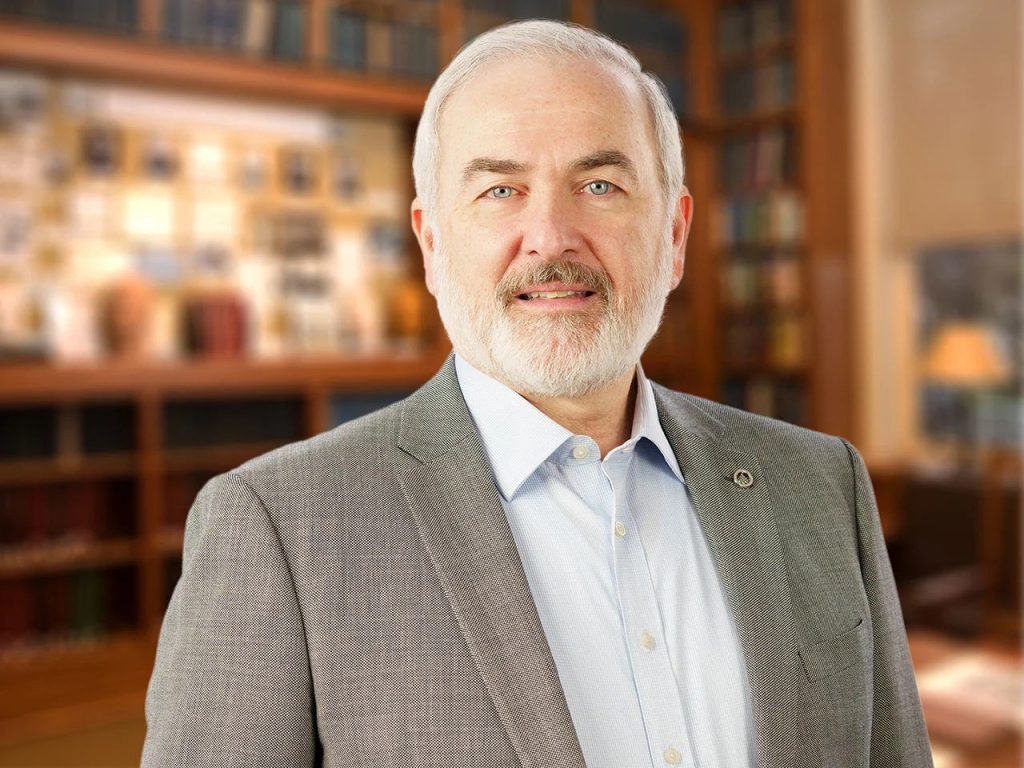9th Annual RNA Symposium
Keynote Speaker Guide — 2025
- John Cooke, Ph.D.
Society for RNA Therapeutics - Beverly L. Davidson, Ph.D.
University of Pennsylvania - Adrian R. Krainer, Ph.D.
Cold Spring Harbor Laboratory - Mats Ljungman, Ph.D.
U-M Center for RNA Biomedicine - Muthiah Manoharan, Ph.D.
Alnylam Pharmaceuticals - Anna Marie Pyle, Ph.D.
Yale University

John Cooke, M.D., Ph.D.
Joseph C. “Rusty” Walter and Carole Walter Looke Presidential Distinguished Chair in Cardiovascular Disease Research,
Department of Cardiovascular Sciences
Director,
Center for Cardiovascular Regeneration
Medical Director,
Center for RNA Therapeutics
Houston Methodist Hospital
“An academic network for design, development, and delivery of personalized mRNA cancer vaccines”
Dr. Cooke trained in Cardiovascular Medicine and obtained a Ph.D. in Physiology at the Mayo Clinic. He then served as an Assistant Professor at Harvard Medical School and developed a Vascular Medicine program at Stanford University, where he was also a Professor and Associate Director of the Stanford Cardiovascular Institute. In July 2013, he joined the Houston Methodist Research Institute (HMRI) as Professor and Chair of the Department of Cardiovascular Sciences, Director of the Center for Cardiovascular Regeneration, Medical Director of the Center for RNA Therapeutics, and Chief Translational Science Officer.
At HMRI, Dr. Cooke founded the RNA Therapeutics program, integrating academic research with product development. His team pioneered processes for mRNA synthesis and delivery, which were licensed to VGXI Inc., and they produce RNA constructs and clinical-grade mRNA for global research and trials. In collaboration with Nanomedicine faculty, his research focuses on RNA delivery methods and regenerative medicine, including treatments for Hutchison Gilford Progeria Syndrome and insights into cellular reprogramming. This work is supported by grants from the National Institutes of Health, the American Heart Association, and others. Dr. Cooke has authored over 550 publications, garnering 33,000 citations and an h-index of 97, and has been honored as an Outstanding Inventor, elected to the National Academy of Inventors in 2019, and received the Mayo Clinic Distinguished Alumni Award in 2020.
Keynote Title:
“An academic network for design, development, and delivery of personalized mRNA cancer vaccines”
Abstract:
We have established a core facility that possesses the infrastructure that comprises the technologies, manufacturing, regulatory oversight, and centralized reporting to allow for the safe and effective implementation of personalized mRNA cancer vaccines. Currently the core facility holds an investigational new drug approval from the FDA for a personalized mRNA cancer vaccine program in the treatment of triple negative breast cancer. While this core structure will initially focus on triple negative breast cancer, with success of the strategy, we intend to build a network of outlying hospitals, and a self-sustainable pipeline to deliver new vaccines for any cancer which are accessible and affordable.

Beverly L. Davidson, Ph.D.
Katherine A. High Chair in Cell and Gene Therapy
Director, Raymond G. Perelman Center for Cellular and Molecular Therapeutics
Chief Scientific Strategy Officer
Children’s Hospital of Philadelphia
Professor of Pathology and Laboratory Medicine
Perelman School of Medicine at the University of Pennsylvania
“Engineering newer generations of AAVs for brain delivery and therapy”
Beverly L. Davidson, Ph.D. is the Director, Raymond G. Perelman Center for Cellular and Molecular Therapeutics, Chief Scientific Strategy Officer, and holds the Katherine A. High Chair in Cell and Gene Therapy at Children’s Hospital of Philadelphia. She is Professor of Pathology and Laboratory Medicine, Perelman School of Medicine, University of Pennsylvania. She received her Ph.D. in Biological Chemistry from University of Michigan.
The Davidson lab is focused on genetic diseases that affect the brain, including how mutant gene products contribute to disease, and why certain brain regions are more susceptible. The team employs advanced molecular methods, sequencing and imaging modalities in animal models, and uses a variety of molecular tools to test various hypotheses. The lab is also engaged in the development of next generation therapeutics for inherited disorders, including the engineering of novel gene therapy vector capsids and cargo to approach tissue and cell type specific treatments.
Honors include the Hereditary Disease Foundation’s Leslie Gehry Brenner Prize for Innovation in Science, the Dr. John W. Schut Research Achievement Award from the National Ataxia Foundation, and elections into the American Academy of Arts and Sciences and the National Academy of Medicine. She is the past president of the American Society of Gene and Cell Therapy, the largest international association of gene and cell therapy research.
Keynote Title:
“Engineering newer generations of AAVs for brain delivery and therapy”
Abstract:
Management of neurodegenerative diseases can benefit from brain delivery of therapeutically relevant proteins including recombinant antibodies and their derivatives, growth factors, or pro-enzymes delivered either indirectly from intravenous injection or directly by infusion into the cerebral spinal fluid (CSF). These include adult and childhood onset disorders such as Alzheimer’s disease (AD), amyotrophic lateral sclerosis (ALS) and lysosomal storage disorders (LSDs). Gene therapy provides an alternative method for sustained expression of therapeutic proteins. Indeed, recent work shows that prolonged expression of recombinant proteins after adeno-associated virus (AAV) delivery to long-lived, ventricle-lining ependymal cells can profoundly impact disease phenotypes in AD mice and LSD dogs. To advance this work to human application, we embarked on a capsid discovery project using a large library of AAV variants screened through relevant models, with the goal of identifying a capsid with improved therapeutic utility. Through this work, we discovered an AAV capsid with unprecedented potency in transducing ependymal cells and cerebral neurons in NHPs. The identified capsid’s potency was conserved in three species of NHP, two mouse strains, and human neurons derived from induced pluripotent stem cells (iPSCs). Importantly, this capsid provided for robust and therapeutically relevant protein expression in NHPs and mice after CSF delivery at doses well below those currently used in the clinic, showing efficacy delivering two different types of payloads for treatment of recessive lysosomal storage diseases or a genetic form of ALS.

Adrian R. Krainer, Ph.D.
Professor
St. Giles Foundation Professor
Cancer Center Program Co-Leader
Cold Spring Harbor Laboratory
“Antisense Therapy for H3.3K27M-Related Diffuse Midline Glioma”
Prof. Adrian Krainer is the St. Giles Foundation Professor and Deputy Director of Research at the CSHL Cancer Center, and a co-founder and Director of Stoke Therapeutics. After earning his B.A. in Biochemistry from Columbia University and Ph.D. from Harvard University under Prof. Tom Maniatis, he became the first Cold Spring Harbor Fellow and joined the faculty in 1989.
His lab focuses on pre-mRNA splicing mechanisms and alternative splicing regulation, aiming to address genetic diseases and cancer. The lab has pioneered antisense technology for therapeutic development, notably co-developing nusinersen (Spinraza), the first approved drug for spinal muscular atrophy. Current research also targets splicing alterations in cancer through antisense therapeutics.
Prof. Krainer has received numerous prestigious awards, including the Albany Medical Center Prize, Wolf Prize in Medicine, and Life Sciences Breakthrough Prize. He is a member of several esteemed academies, reflecting his significant contributions to biochemistry and biotechnology.
Keynote Title:
“Antisense Therapy for H3.3K27M-Related Diffuse Midline Glioma”
Abstract:
Diffuse midline gliomas (DMGs) are pediatric high-grade brain tumors in the thalamus, midbrain, or pons; the latter are called diffuse intrinsic pontine gliomas (DIPG) or H3.3K27M-related DMG. The brain-stem location limits the clinical management of these tu mors, resulting in exceedingly poor outcomes. A heterozygous point mutation in one of two non-canonical histone H3.3 genes is present in most DIPG tumors. This dominant, somatic mutation alters H3-3A, replacing lysine 27 with methionine (K27M) in the protein, and results in global reduction of K27 tri-methylation of all wild-type histone H3 proteins, which is a driving event in gliomagenesis. We developed a lead antisense oligonucleotide (ASO) that directs RNase-H-mediated knockdown of H3-3A mRNA. ASO treatment restored K27 trimethylation of histone H3 proteins and significantly reduced tumor growth, promoted neural-stem-cell differentiation, and increased survival in two DIPG mouse models. As an alternative strategy to reduce expression of the toxic mutant protein, we are developing a lead splice-switching ASO that forces skipping of the exon encoding the mutation and the start codon. Our results demonstrate the involvement of the H3.3K27M oncohistone in tumor maintenance, and the reversibility of the aberrant epigenetic changes it promotes, in addition to providing preclinical proof-of-concept for DMG antisense therapy.

Mats Ljungman, Ph.D.
Professor,
Radiation Oncology
Environmental Health Science
Co-Director,
Center for RNA Biomedicine
University of Michigan
“Targeting cancer with personalized precision RNA therapeutics”
Professor Ljungman grew up in Stockholm, Sweden. After attending four years of college studies in the USA, Ljungman performed his graduate studies at Stockholm University and then my postdoctoral work at Stanford University. In 1994, Professor Ljungman became Assistant Professor in the Department of Radiation Oncology at the University of Michigan Medical School where he has been ever since. Professor Ljungman’s early work identified blockage of transcription as a major trigger of p53 and apoptosis after DNA damage. To map transcription genome-wide and to investigate the effect of DNA damage on ongoing transcription, Ljungman developed Bru-seq, which is based on bromouridine labeling of nascent RNA followed by immunocapturing and deep sequencing of the Bru-labeled RNA. Professor Ljungman have been fortunate to be part of the ENCODE Consortium for the last 10 years. Recently Ljungman developed Precision KLIPP Therapy as a universal and specific cancer-targeting approach. Professor Ljungman is the co-director of the Center for RNA Biomedicine at the University of Michigan and am leading the work to develop “M-RNA Therapeutics” as a global resource to aid RNA therapeutics. Professor Ljungman has published >150 peer-reviewed articles.
Keynote Title:
“Targeting cancer with personalized precision RNA therapeutics”
Abstract:
Current anti-cancer treatments give rise to dose-limiting toxicity in normal tissues. We have developed a precision CRISPR-based approach to target genomic features that are unique to cancer cells. This approach, KLIPP, utilizes a “split-enzyme” dead Cas9 fused to an endonuclease Fok1 where two Fok1-dCas9 complexes need to homodimerize to activate the endonuclease. Using whole genome sequencing of the patient’s cancer, we identify cancer-specific structural variant junctions (SVJs) and design sgRNA that binds to sequences flanking the SVJs. We show that KLIPP, delivered using lipid nanoparticles, induces DNA double strand breaks specifically in cancer cells causing toxicity. SVJs in fusion oncogenes and in amplicons of oncogenes, such as on ecDNA, are of specific interest to target with KLIPP.

Muthiah (Mano) Manoharan, Ph.D.
Senior Vice President of Drug Innovation,
Scientific Advisory Board Member,
Distinguished Research Scientist
Alnylam Pharmaceuticals
“Biometric chemistry of RNA therapeutics”
Muthiah (Mano) Manoharan serves as a Senior Vice President, a Scientific Advisory Board Member, and a Distinguished Research Scientist at Alnylam Pharmaceuticals, Cambridge, Massachusetts, USA. In 2003, he was the first chemist hired at Alnylam. He and his team pioneered the discovery and development of the chemical modifications that make RNA interference-based human therapeutics possible. This work led to ONPATTRO (patisiran), the first RNAi therapeutic approved by FDA in 2018. Mano has had a distinguished career as a world-leading chemist in the areas of oligonucleotide chemical modifications, conjugation chemistry, and delivery platforms (lipid nanoparticles, polymer conjugates, and complex-forming strategies). Mano’s research group demonstrated for the first time the human therapeutic applications of GalNAc-conjugated oligonucleotides at Alnylam, a platform that has revolutionized the nucleic acid-based therapeutics field with several compounds presently in the advanced clinical trials. Prior to Alnylam, Mano worked at Ionis (formerly Isis) Pharmaceuticals (1990-2003) and Lifecodes Corporation (1988-1990) in the field of antisense oligonucleotide therapeutics.
Mano earned his Ph.D. in chemistry with Professor Ernest L. Eliel at the University of North Carolina, Chapel Hill in 1983 where he carried out synthesis and conformational analysis of heterocyclic compounds. He started working in the field of oligonucleotides with Professor John A. Gerlt at Yale University in 1983 as a post-doctoral research associate, and delineated mechanisms of DNA repair enzymes using synthetic oligonucleotides. He is an author of more than 220 publications (nearly 43,000 Google Scholar citations with an h-index of 94 and an i10-index of 367) and over 400 abstracts, as well as an inventor of over 240 issued U.S. patents. Mano has received the M. L. Wolfrom Award from the American Chemical Society Carbohydrate Chemistry Division in 2007 and has been recognized as the Lifetime Achievement Awardee of the Oligonucleotide Therapeutics Society in 2019.
Keynote Title:
“Biometric chemistry of RNA therapeutics”
Abstract:
According to Professor Ron Breslow, “biomimetic chemistry” is new chemistry inspired by the principles used by Nature. Synthetic small interfering RNAs (siRNAs) are potent inhibitors of gene expression. These molecules are perfect examples of biomimetic chemistry as synthetic siRNAs act through the natural RNA interference (RNAi) pathway. To deliver therapeutic siRNAs into human liver, we developed approaches that include chemical modification of the siRNAs and either lipid nanoparticle (LNP) formulation or multivalent N-acetylgalactosamine (GalNAc) conjugation, making possible intravenous and subcutaneous administration, respectively. The design of chemical modifications of siRNAs to enable favorable Argonaute2 (Ago2) recognition as well as both delivery strategies rely on biomimetics. The LNP approach is based on the endogenous Apo-E ligand /LDL receptor process. Conjugation of the GalNAc ligand to an siRNA mediates it uptake into liver hepatocytes through the asialoglycoprotein receptor. Using these strategies five approved RNAi therapeutics have emerged from Alnylam. We have also used lipid conjugates for CNS delivery of therapeutic siRNAs. This presentation will cover the molecular basis of RNA therapeutics including the chemical modifications and motifs used in each RNA strand to ensure uptake into cells of the targeted tissue, Ago2 recognition, silencing efficiency, metabolic stability, and safety.

Anna Marie Pyle, Ph.D.
Sterling Professor,
Yale University
Molecular, Cellular and Developmental Biology
Chemistry,
Howard Hughes Medical Institute
“Panning for gold: Discovering and drugging riboregulatory structures within viral genomes and eukaryotic mRNAs”
Anna Marie Pyle is a Sterling Professor in the Departments of Molecular, Cellular and Developmental Biology and the Department of Chemistry.She has been a Howard Hughes Medical Institute Investigator since 1997. Dr. Pyle obtained her undergraduate degree in Chemistry from Princeton University and received her Ph.D. in Chemistry from Columbia University in 1990, where she worked with Professor Jacqueline Barton. Dr. Pyle was a postdoctoral fellow with Thomas Cech at the University of Colorado, forming her own research group in 1992 in the Department of Biochemistry and Molecular Biophysics at Columbia University Medical Center. In 2002, she moved to Yale University, where she leads a research group that specializes in structure and function of large RNA molecules, RNA remodeling enzymes and cellular RNA sensors. Dr. Pyle teaches the undergraduate Molecular Biology course and serves on the University Budget Committee at Yale. Dr. Pyle is the President of the RNA Society and she served as the Chair of the MSFA Study Section at the NIH after serving as permanent member on the MSFE, and MGB study sections. She is Vice-Chair of the Science and Technology Steering Committee at Brookhaven National Labs and she is on the Board of Telluride Science Research Center. She is involved in the development of RNA as a therapeutic and a drug target, serving on the SAB of Arrakis Therapeutics. Dr. Pyle is the author of over 190 publications and has mentored more than 40 graduate students and postdocs. The Pyle laboratory uses structural biology, enzymology and cell biology understand the structural complexity of large RNA molecules and the proteins that recognize them. She solved the first structures of pre-mRNA splicing machines, and led efforts to characterize RNA structures in noncoding RNAs and viral genomes. Dr. Pyle pioneered the study of RNA helicase enzymes and antiviral innate immune receptors in mammalian cells.
Keynote Title:
“Panning for gold: Discovering and drugging riboregulatory structures within viral genomes and eukaryotic mRNAs”
Abstract:
It is becoming increasingly clear that RNA viruses have highly structured RNA genomes, even within ORF regions, and that many the of these folded structural motifs play essential roles in viral life cycles. Moreover, riboregulatory strategies discovered in viral genomes are often subsequently identified within our own mRNAs, making it all the more important to mine viral genomes for mechanistic information. Despite our increasing awareness of riboregulation in many viral families, some of the most interesting genomes have remained structurally and functionally uncharacterized. Here we describe a pipeline for rapid discovery, structural and functional characterization of critical riboregulatory motifs within the genomes of novel RNA virus families, with a special focus on flaviviruses and noroviruses, and a particular emphasis on complex structural motifs within ORFs. This type of analysis not only charts the landscape of RNA structures and riboregulatory elements, it provides a new means for identifying therapeutic targets within pathogens and within human genes themselves.

